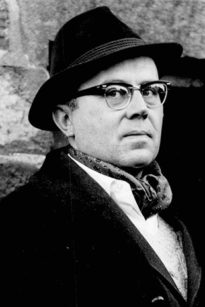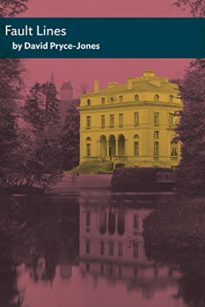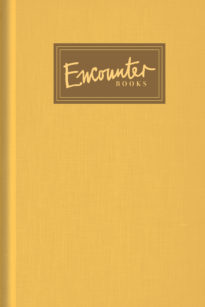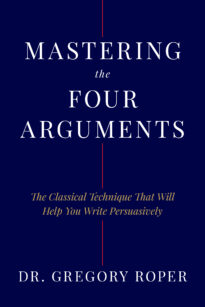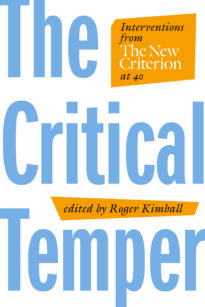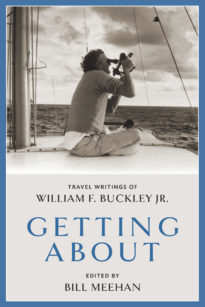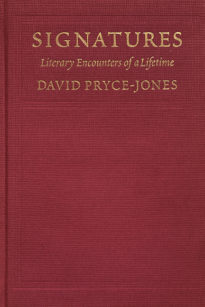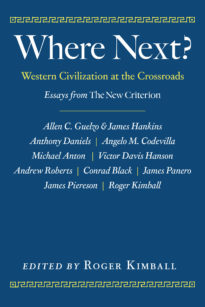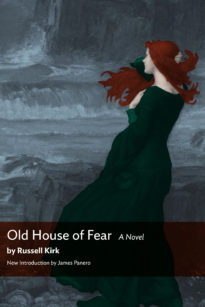A founding father of the American conservative movement, Russell Kirk (1918–94) was also a renowned and bestselling writer of fiction. Kirk’s focus was the ghost story, or “ghostly tale” – a “decayed art” of which he considered himself a “last remaining master.” Old House of Fear, Kirk’s first novel, revealed this mastery at work. Its 1961 publication was a sensation, outselling all of Kirk’s other books combined, including The Conservative Mind, his iconic study of American conservative thought. A native of Michigan, Kirk set Old House of Fear in the haunted isles of the Outer Hebrides, drawing on his time in Scotland as the first American to earn a doctorate of letters from the University of St. Andrews. The story concerns Hugh Logan, an attorney sent by an aging American industrialist to Carnglass to purchase his ancestral island and its castle called the Old House of Fear. On the island, Logan meets Mary MacAskival, a red-haired ingénue and love interest, and the two face off against Dr. Edmund Jackman, a mystic who has the island under his own mysterious control. This new edition features an introduction by James Panero, Executive Editor of The New Criterion.
Free shipping on all orders over $40
Old House of Fear
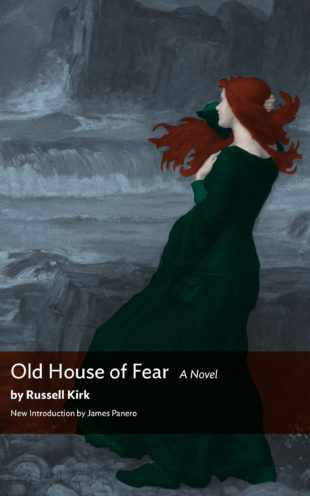
Also Purchase as e-Book
Publication Details
Paperback / 264 pages
ISBN: 9780985905286
Available: 10/29/2019
- Media: Request a Review Copy
- Academia: Request an Exam Copy
About the Author
Russell Kirk was the apostle of “permanent things.” His book The Conservative Mind, published in 1953, was the rallying point for the renewal of a long-dormant spirit of serious attention to the founding moral, religious, social, and political principles animating the ideal of ordered liberty, especially in its flowering in the grand American experiment in self-governance.
Praise
Excerpt
On this shrouded night, five men tossed in a boat off
the island of Carnglass, where the sea never is smooth. So
thick about them hung the fog that they could not see the
great cliffs. Knowing, though, every rock and reef, they
sensed where the island lay.
Of a sudden, a tall flame shot up from Carnglass, fierce
and unnatural. Across the swell there came to the men in
the boat the crash of some explosion. Clinging to their oars,
they stared silent toward the land; the oldest man crossed
himself. The flame, surging and waving for some minutes,
soon sank lower. In a little while they heard faint distant
sounds, several of them, like gunshots. The younger men
looked to the old helmsman, who pulled hesitantly at his
white beard.
Then he signed to them to put the boat about. Glancing
fearfully at the distant flame as they heaved, two men
hauled at the sail. In a minute they had changed course, and
the fire in the night glowed at their backs as they pulled
away from the uneasy neighborhood of silent and invisible
Carnglass.
Three thousand miles away, two men sat in a handsome office.
“That’s our island,” Duncan MacAskival said: “Carnglass.”
Across the Ordnance Survey map his thick forefinger
moved to a ragged and twisted little outline, away at the
verge of the Hebrides, which even upon the linen of the map
seemed to recoil from the Atlantic combers. “The tattered
top of a drowned mountain. And that’s the castle, by the bay
to the West, Hugh: Old House of Fear. I like the names.
You’re to buy Carnglass for me, cliffs and clachans and deerforest
and Old House and all; and price is no object.”
Hugh Logan smiled at the heavy old man in the swivel
chair. “Why send me to the Western Isles to haggle for a
speck of rock I know nothing about, Mr. MacAskival? Why
do you need Carnglass? And why not have a Glasgow solicitor
do the business for you? I’d enjoy the trip, right enough,
but I don’t need to tell you that my time costs you bona fide
money. Any junior clerk could buy an island for you.”
“Look out there, Hugh.” MacAskival swung round his
chair to the big window at the back of his teak-panelled
office. Far below, stretching eastward for a quarter of a mile
along the river, the stacks and coke-ovens and corrugatediron
roofs of MacAskival Iron Works sent up to heaven their
smoke and flame and thunder. “Look at it all. I made it. And
what has it given me? Two coronary fits. I’m told to rest. But
where could a man like me fade decently? I’m not made for
quiet desperation. There’s just one place, Hugh, where I
might lie quiet; and that’s Carnglass.”
MacAskival peered at his map. “I haven’t seen Carnglass,”
he went on, “except in pictures, and no more did my father,
or his father. But the MacAskivals came out of Carnglass to
Nova Scotia in 1780, and they didn’t forget the little croft
below Cailleach – that’s the sharp hill north of the Old
House, Hugh. Their Nova Scotia farm was sand and stumps,
and yet not so barren as that Carnglass croft. Still, they’d
have traded ten farms in Nova Scotia for that wet little plot
in Carnglass. And after two strokes, I think I’d give the mills
and all for that croft – with the island thrown in.”
Logan had walked to the window, and now stood looking
toward the glare of the coke-ovens; the flames went up
hotly into the Michigan twilight, that April evening, and
the incandescent masses of coal fell roaring. “Why, I think
we might make a better bargain than that, Mr. MacAskival.
Peat bogs and tumbledown castles go cheap nowadays. But
why do you mean to send a man like me to buy you a few
square miles of dripping misery?”
“Cigar, Hugh?” MacAskival pushed a box toward him.
“The doctor says I can have just one of these a day. Well, I’m
not so crazy as I seem, and you know it. Under your veneer,
you’re like me – sentimental as a sick old ironmaster. Don’t
tell me you’ve never thought of having an island all to yourself.
So I’d like to see you hunt this dream of mine; you work
too hard for your age. ‘Getting and spending, we lay waste
our powers.’ I don’t plan to bare my bosom to the moon in
Carnglass, but it should do you good to play at being a
pagan suckled in a creed outworn – for a few days, anyhow.”
Old Duncan MacAskival was a trifle vain of his quotations
and allusions, Logan thought. But Logan liked MacAskival,
a self-made man, a good deal better than the average
product of the big business-administration schools. It came
to Logan that he, Hugh Logan, rapidly was growing into an
old man’s young man. It had been more than a dozen years
since he had led a battalion in Okinawa. He knew much of
Scotland, born in Edinburgh as he had been, though his
parents had taken him to America when he was nine; and he
had gone back to take a degree at Edinburgh University. A
slackening of pace, for a week or two, might do no mischief.
All his life he had hurried: schools, the university, the war,
and the firm: in too much of a hurry, either side of the water,
to laugh, to marry, or even to dream. “No Mr. MacAskival,”
Logan said, “I’m not the man to laugh at you. But you’re a
canny Scot, though five generations removed. Do you need
to pay my price just to draw up a deed to an island?”
“You’re more of a Scot than I am, Hugh, though you look
American enough nowadays.” MacAskival leant back in his
heavy chair. “Well, yes, you’ll be worth your price in this
business. You know something of Scots law and tenures. And
you can wheedle odd customers; Lady MacAskival is one of
that breed, they tell me. Here, look at yourself in that mirror.”
MacAskival nodded toward the baroque glass against
the teak panelling.
Logan saw reflected a mild-seeming, amiable face – or so
most people would call it, probably – almost unlined; still a
young man’s face. Sometimes, when he had been a major of
infantry, that face had tended to mislead people, and then
Logan had to rectify impressions. He had a spare body. “Do
I look like a fool?” he asked MacAskival.
“Not exactly a fool, boy, but close enough. You’re innocent:
that’s the word, Hugh. What a face to set before a jury –
or a crazy old creature like Lady MacAskival! Anyone signing
a contract with you assumes that he’s had the better of the
bargain. Now I’ve tried before this to buy Carnglass; I’ve been
at it more than three years. I’ve tried those Glasgow solicitors.
They’re too sharp: what we need with Lady MacAskival
is babyish innocence.”
“Can’t you find any intermediary but a Glasgow solicitor?”
“Why, Hugh, somehow I got in touch with a retired major
or captain – Indian Army, I think – who wrote that he might
do my business for me. He seemed to want his palm greased.
His name was George Hare, or George Mare, or something
of that sort.”
Logan rubbed his chin. “In Glasgow? There was a criminal
case, if I’m not mistaken – something to do with state
secrets, or vexing little girls, or some nasty affair – in Scotland,
a year or two ago, with the defendant a cashiered Indian
Army officer – and that sort of name. I may have a clipping
about it in my files. I’m not sure, though, that the name was
either Hare or Mare. A captain, I think.”
“For all I know, Hugh, this may be your man: anyway,
though I greased his palm in moderation, I’ve never had a
line from him since. He said he knew Lady MacAskival. So
that’s a bribe down the drain. Now will you take my shilling?”
“All right: I’ll take my innocence to Carnglass.” Smiling,
Logan turned back to the map on the big desk. “There still
are MacAskivals in the island, then? And what sort of cousin
of yours is this Lady MacAskival?”
“Call me Duncan, Hugh,” MacAskival said, “if you’ll really
take up the business for me. No, there’s not a real MacAskival
left in Carnglass, so far as I can learn. Lady MacAskival was
born Miss Ann Robertson; her family owned distilleries,
money-makers. It was a queer match when she married Colonel
Sir Alastair MacAskival, Indian Army, who was old
enough to be her father, or more. Sir Alastair had scars and
medals, but nothing besides. Though he was chief of the MacAskivals
– and there’s precious few of that little clan left – he
was born in a but-and-ben in North Uist. I get all this from
an Edinburgh genealogist. Sir Alastair’s great-grandfather
ran through his property so as to keep up a fine show in
London. The Great Clearance of Carnglass was in 1780 –
that’s when my people were booted out, you remember –
and it was the work of that old reprobate Donald MacAskival,
our Sir Alastair’s great-grandfather: he turned the whole
island into two big farms and a sheepwalk, on the chance of
squeezing more money from the rents, and told all the crofting
MacAskivals to go to Hell or Glasgow. A few had the
money for steerage passage to Nova Scotia, which eventually
made me president of MacAskival Iron Works. My father
was a pushing Scot, and so am I – and you, too, Hugh.”
“So Ann Robertson brought money back to the MacAskivals
more than a hundred years after the Clearance?”
“Not simply money, Hugh, but Carnglass itself. What
little extra Donald MacAskival contrived to wring out of the
rents after the Great Clearance did him no good. He died
bankrupt; and the creditors took Carnglass. His son sank
down to being the factor for a small laird in North Uist, and
there the family lived on, hand to mouth, until young
Alastair went out to India and got some reputation for himself
along the Northwest Frontier. When he was past forty,
he sailed home to Edinburgh on leave. There he met Ann
Robertson, and married her, and they bought back Carnglass
with Robertson money, and restored Old House of Fear.
